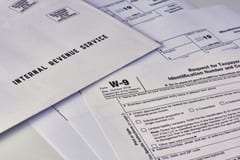Tax Form W-9: A guide for small businesses
4 min read
February 25, 2021 • Block Advisors
Growing your business is an exciting thing—but it comes with new and uncharted tasks from a tax perspective. One new task you’ll encounter if you’re hiring a contractor(s) is completing and filing tax Form W-9.
Or, if you’re self-employed, you may find that you need to complete Form W-9 for companies you’re contracting with.
Read on to learn about W-9 requirements, who needs file it, how to file it, and why it matters as a small business owner.
What is a W-9 Form?
First things first — Let’s answer the question “What is a W-9 form?”
The W-9 is the Request for Taxpayer Identification Number and Certification. This form requests information from a contractor, including their:

- Name
- Mailing address
- Social Security number (SSN) or Employer Identification Number (EIN)
- Exemptions
- Business organization classification
- Signature
As a small business owner, you should use this form to collect taxpayer identification information from those working for you. Each tax season, you’ll need this information to properly complete IRS information returns due January 31.
Who should fill out Tax Form W-9?
The Tax Form W-9 should be completed by the person whose SSN or EIN will go on the form. So, any vendor, contractor, or third-party who is NOT a W-2 employee (and earns $600 or more per year) needs to receive and complete Form W-9. Good business practices would include presenting the W-9 to any vendor, contractor, or third-party before contracting any work to be done or paying any invoice. It is often difficult to obtain information after a contract is completed and the contractor is paid.
As a reminder, this would be an individual or business who was hired to accomplish a specific task, but who is not included on your business’ payroll. For W-9 contractors, you would not withhold taxes throughout the year, as they are responsible for self-employment tax.
Business owners should request this information from qualifying contractors by January 31. If the deadline falls on a weekend or holiday, the Form W-9 and Form W-2 deadline will be the next business day.
Ok, so how are Form 1099 and a W-9 different?
Business owners use the W-9 to accurately prepare the 1099. The 1099 reports income to the IRS, while the W-9 simply certifies tax information from independent contractors. In fact, you don’t actually send W-9s to the IRS—it’s only used to get the information from independent contractors.
Once you compile the information on each W-9 you collect, you’ll use it on your Form 1099-NEC. You may also want to know about IRS form 1096, which you might need when filing by mail. Learn more about IRS Form 1099-NEC.
W-9 requirements and instructions
Most of the W-9 requirements are pretty straightforward – things like your name, business name (if you have one), and your address.
The part that might cause some to pause is checking the box that indicates your tax classification and your Tax Identification number. Many individuals will simply check the “individuals” box and use their SSN. If you’re newly self-employed, this form may spark conversation about what type of entity or tax structure you should have.
Not sure what’s right for you? You can always lean on our small business certified tax pros for help.
How do I get a W-9 for my business?
Wondering “how do I get a W-9 for my business?” You can download and print W-9s from the IRS at https://www.irs.gov/pub/irs-pdf/fw9.pdf.
Remember, assistance with small business tax forms like the W-9 corporate tax deadlines is at your fingertips. Block Advisors certified small business tax pros are ready to help – in person, or via phone, video or chat.



